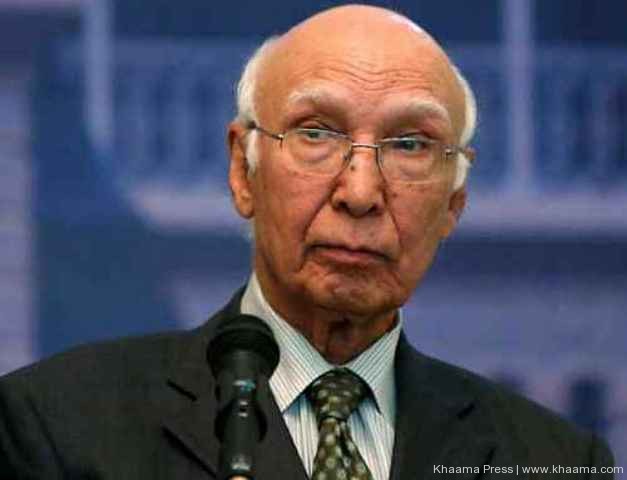Time Not Right For Revival Of Afghan Talks: Sartaj Aziz
Sartaj Aziz

NEW DELHI: Pakistan’s National Security Advisor Sartaj Aziz confirmed that Pakistan-Afghan talks are off the table, as Pakistan and Afghanistan relations slump back to the low that has characterised them for years.
“Right now I don’t think the time is opportune,” Aziz was quoted by Dawn News. Speaking at the Institute of Strategic Studies Islamabad, Aziz said: “Pre-conditions for a successful outcome are required, and that requires consensus on both sides. The Afghanistan government is one of the sides and the Taliban are the other, and they have to come to the situation which they think that useful discussions can take place.”
An Afghanistan and Pakistan dialogue -- the result of Afghan President Ashraf Ghani’s more favourable position toward Pakistan compared to his predecessor Hamid Karzai -- resulted in the Taliban agreeing to talk with the Afghan government for the first time in 13 years. The talks, and with it Afghan-Pak relations, hit a roadblock in August, when the death of Taliban leader Mullah Omar spurred a particularly bloody period in the conflict-torn country.
Although Pakistan and Afghanistan tried to hold a few high level meetings to keep their engagement on track, soon enough Ghani was using the same harsh rhetoric against Pakistan as Karzai used to, blaming the neighbouring country for not doing enough to reign in terrorists.
Pakistan and Afghanistan have shared a shaky relationship, with a large number of Afghans blaming Pakistan for supporting and hence perpetrating the Taliban. Ghani decided to reach out to Pakistan despite the criticism, with some going so far as to accuse Ghani of sleeping with the enemy.
Ghani’s decision to improve ties was directly linked to Pakistan’s influence over the insurgent, which, in turn, is ironically the main source of ammunition for Ghani’s anti-Pakistan critics. When Ghani came to power in September last year, he quickly signalled a change in policy. Ghani soon after being sworn-in visited Pakistan, and then Pakistan’s army chief and head of intelligence visited Kabul. Afghanistan and Pakistan’s tense equation had sunk to an all-time low under the presidency of former Afghan President Hamid Karzai. Karzai had been openly critical of Pakistan -- accusing the neighbouring country of supporting the Afghan Taliban and providing refuge to the group’s leadership.
Delegations from the two countries made visits across the border; six Afghan army cadets were sent to Pakistan for training; military efforts were coordinated across the shared border; and Ghani and Pakistani Prime Minister Nawaz Sharif both issued statements in support of cooperation and bilateral ties.
The two countries even signed an agreement between Afghan National Directorate of Security (NDS) and Pakistan’s Inter Services Intelligence (ISI) -- a move widely criticised by the camp opposing the betterment of ties.
The shift in policy seemed to be bearing fruit, with reports circulating that the Afghan Taliban -- under pressure from Pakistan was on the verge of agreeing to talks with the Afghan leadership. This was huge. For the first time in thirteen years -- since the US invasion of Afghanistan -- the Taliban, which has thus far maintained that the Afghan government is illegitimate, was ready to initiate a peace process.
Then Ghani’s trip to Washington happened, where US President Barack Obama announced the decision to slow troop withdrawal. The Taliban, in turn, issued a statement vowing to continue fighting. "This damages all the prospects for peace, Taliban spokesman Zabihullah Mujahid said of the announcement. “This means the war will go on until they are defeated.”
All this has been the source of much criticism. In an interview with The Guardian, former Afghan President Hamid Karzai -- said that the country’s historic struggles against British imperialism and Soviet invasion will have been in vain if it succumbs to pressure from Pakistan.
This view was echoed by Karzai’s associates who sat in on the interview. Rangin Dadfar Spanta, a former foreign minister and national security adviser said that the policy amounts to the humiliating “appeasement” of a hostile power who would never change its ways. In a similar vein, Omar Daudzai, one of the most influential officials of the Karzai era who served as chief of staff and interior minister, predicts, “There could be a bloody summer, there will be fighting and there will be disappointments on the dialogue table from time to time.” Daudzai, a former ambassador to Islamabad, added that whilst he thought Ghani’s attempts to woo Pakistan were “courageous,” they would ultimately fail to change the country’s behaviour. “He has taken controversial steps that his predecessor didn’t take, and now we have to wait to see whether the Pakistani side is sincere or not,” he said. “But I am far more sceptical than I ever was before about Pakistan’s sincerity.”
And this is by no means an isolated view. An important figure within Afghanistan, Karzai echoes a distrust that runs deep with the Afghan people.
Ghani had taken a major gamble by reaching out to Pakistan, as the move was unpopular with powerful critics within Afghanistan. Although at one point it seemed like the gamble could yield results, as indicated by the Taliban agreeing to talks, the optimism was short-lived. In the end, the anti-Pakistan camp in Afghanistan was proved right, and Afghanistan currently is witnessing one of its most bloodiest periods yet as the Taliban makes some of its biggest gains since its government was overthrown 13 years ago.



